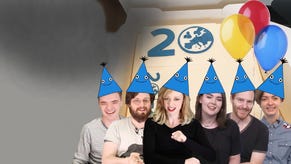Retrospective: Manhunt
Snuff's enough.
One hour. One single hour of following, listening, hiding and planning, of false starts and botched lunges. One hour of tracking a solitary armed guard in the circular hedge maze in Lionel Starkweather's grounds, waiting for the perfect moment to risk it all, move in and finish the kill. Any mistake would be fatal, sending me back to a distant checkpoint I had no interest in returning to. So that hour was everything. And the kill, when it finally came - was it satisfying? Not really. All I felt was relief. Relief, and a sickening tinge of dread, because now another little yellow arrow had just appeared on my radar
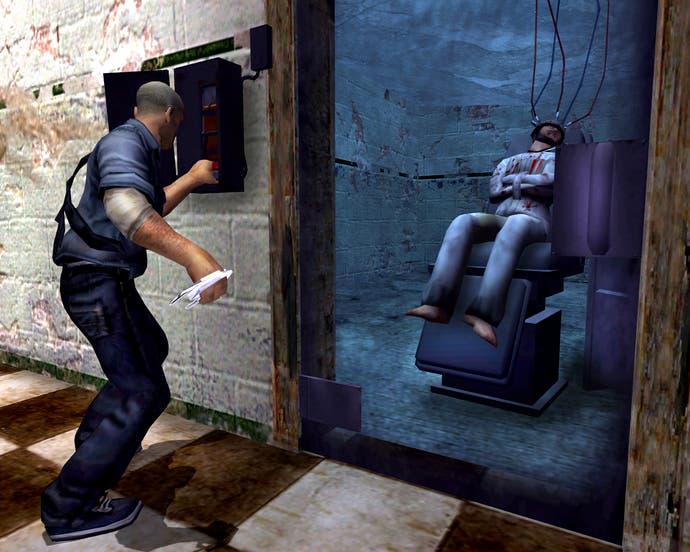
That hour will always be my overriding memory of Rockstar's menacing videogame-nasty, Manhunt. It's almost certainly the most tense I've ever felt while holding a controller, and one that places just how successful and engrossing a piece of work it is in microcosm. And while it was my defining moment, for many others it may have barely registered, their own trials having taken place elsewhere in Carcer City, the game's labyrinthine lair of death and depravity.
When Manhunt released in a wave of controversy and noise in November 2003, Rockstar was at the height of its pomp as a developer and a publisher. Riding high off the success of Grand Theft Auto Vice City and never afraid of stirring up a little tabloid attention, the Housers' next project felt like a test; how far could they push the boundaries of acceptability in this brave new age for the medium? Pretty far, it turns out.
It all starts with the 'hero'. Not content with having us play with GTA's nondescript criminals-du-jour, Manhunt's protagonist is a convicted murderer on death row. James Earl Cash, with his bald head and scruffy shirt, is not a nice fellow. The game begins with his apparent execution where he's strapped to a gurney and given a lethal injection. A few hours later, he wakes up, confused, shaken, lost, and with a voice growling in his ear - Brian Cox's oozing, fetid Director.
Manhunt is an astonishingly grubby game. Carcer City is a haven for the broken, a rotting carcass of a civilisation gone bad, and even in its pointy, corners-and-folds PS2 architecture, still one of the most unpleasant game worlds this side of Ravenholm. And what you have to do within it is equally unpleasant. The Director promises you freedom if you follow his every command, and within seconds you're asked to off an oblivious bad guy - or at least we assume he's a bad guy - by sneaking up behind him and choking him to death with a carrier bag. Animal Crossing this ain't.
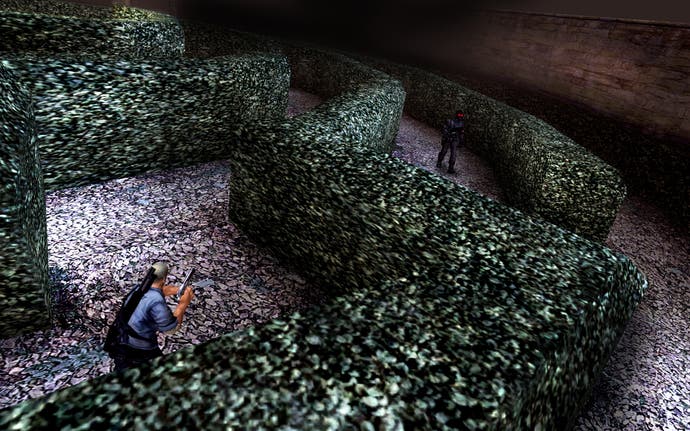
The action cuts away to CCTV footage of your gruesome acts whenever you carry out a kill, neatly tapping into the Big Brother-is-watching-you new reality of the early 2000s, all while The Director watches and drools over your handiwork. It's shocking at times, and still one of the strongest examples of 'adult' videogaming yet made. However, Manhunt isn't just a violent game; it's a game about violence.
Before BioShock toyed with the notion of player agency and will, Manhunt did the very same thing. Killing enemies is expected in gaming, carried out without thought or consideration, but Manhunt's notorious 'three-tier' kill system changes that. As you sneak up behind a hunter - one of Carcer City's twisted gang members, employed by The Director as both enemy and prey - the reticule changes colour depending on how long you're willing to wait before delivering a kill.
The longer you wait, the more gruesome the slaying, giving you a higher rating at the end of each level. But who are you doing it for? For The Director, and certainly not yourself. Manhunt makes you question exactly why you're electing to execute your enemies - who are you pleasing, why do you want to see the worst, nastiest kills? It's easily read as a comment about videogame violence, albeit one wrapped up and reverent in its own brutality. It's certainly a much smarter game than many had given it credit for.
Even the nastiest kills, though, don't quite have the same effect now as they did in 2003. After an onslaught of stabbings, throat slits, shotgun blasts to the face and arrows to the neck at this year's E3, captured brilliantly by John Teti's Gameological Society, Manhunt feels almost normal. I'm not sure quite how we've got to the point where the world's nastiest game is now comparable to mainstream AAA blockbusters, but it's hard not to think of Manhunt as gallingly prophetic.
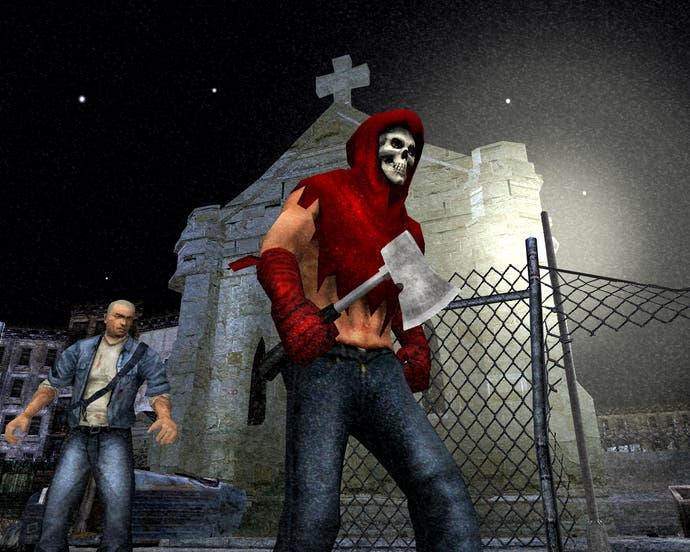
Not that you'll be thinking about any of this when you're neck deep in the filth and the fury, of course. Manhunt, fundamentally, is a stealth game, and one almost entirely uncompromising in its approach. Dealing with more than a single enemy at once is a sure-fire way to die, while alerting a group to your presence turns the game into the very essence of its name.
While unforgiving, the stealth is simple - shadows equal sanctuary. This means Manhunt adheres to a very strict and uncomplicated set of rules that allow you to plan and orchestrate your attacks, all the while knowing the limits of your abilities to remain unseen. Hence the hour-long war of attrition against the poor guy who didn't even know I was there.
It's that slightly over-simplified stealth that caused some to struggle with Manhunt and the leap of faith it asked of your suspension of disbelief. Often, a hunter could be standing mere feet away from you with no idea you were there. For many, this was too much to take, leading to a memorable 3/10 score in a magazine I worked for years ago and a distinct backlash against Rockstar's supposed vile-over-substance MO.
While it's hard not to empathise with those complaints, especially during early sections of the game where the hunters are about as intelligent as a Jersey Shore housemate, letting that ruin the experience is almost criminal. As the story progresses and Cash is put through an escalating series of horrors, including witnessing the murder of his own family, the pace quickens, the enemies become smarter and harsher, working together to track you down, checking in dark corners and even using torches.
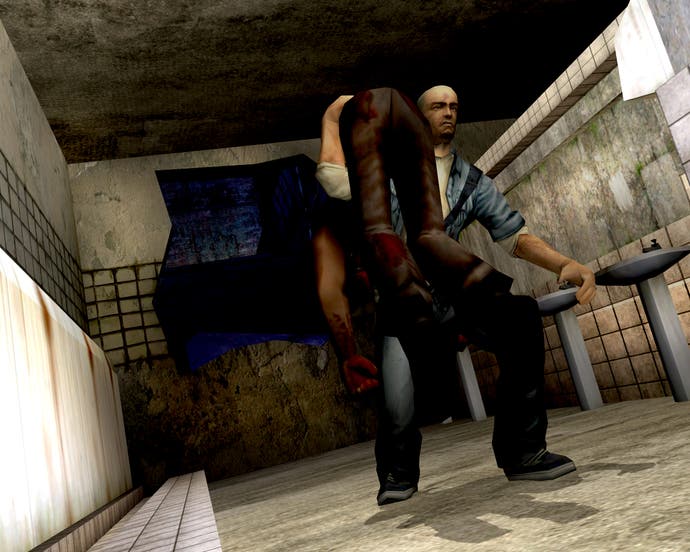
Then, the hunted becomes hunter, before being hunted again. It all leads up to a climactic showdown with The Director (who's revealed to be Vinewood movie mogul turned snuff-film purveyor Lionel Starkweather) and his 'bodyguard', Piggsy. In a game without bosses, Piggsy is an unnerving, hyperreal nightmare, a mentally handicapped Ed Gein-a-like with a pig's head for a helmet and a chainsaw in his stubby hands.
The final act sees you trapped in Starkweather's attic with only the roar of Piggsy's weapon and his lurching, guttural squeals for company. The two stalk each other in a ghastly game of hide and seek; a fight that perfectly captures the spirit and mechanics of the game while upping the stakes immeasurably.
Perhaps the greatest indication of Manhunt's achievements comes from looking at its sequel, a game that struggled to gain classification in this country before finally appearing on the Wii, of all things. Manhunt 2 kept the violence and nastiness of the original but lost its intelligence, almost becoming a parody of itself and a genuinely abhorrent ride rather than one laced with satire and commentary.
Playing Manhunt today is a curious and unsettling experience. The PS2 version is an echo of a time lost, with its esoteric controls (hold the triggers to strafe), carefully crafted manual and noticeable lack of modern tropes like achievements or leaderboards. It's a masterclass in suspense and tension, in setting and tone, and a measured glimpse into a videogaming future now dominated by ultraviolence.
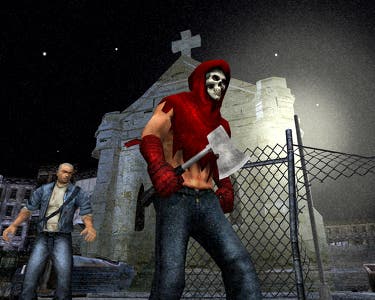

.jpg?width=291&height=164&fit=crop&quality=80&format=jpg&auto=webp)
